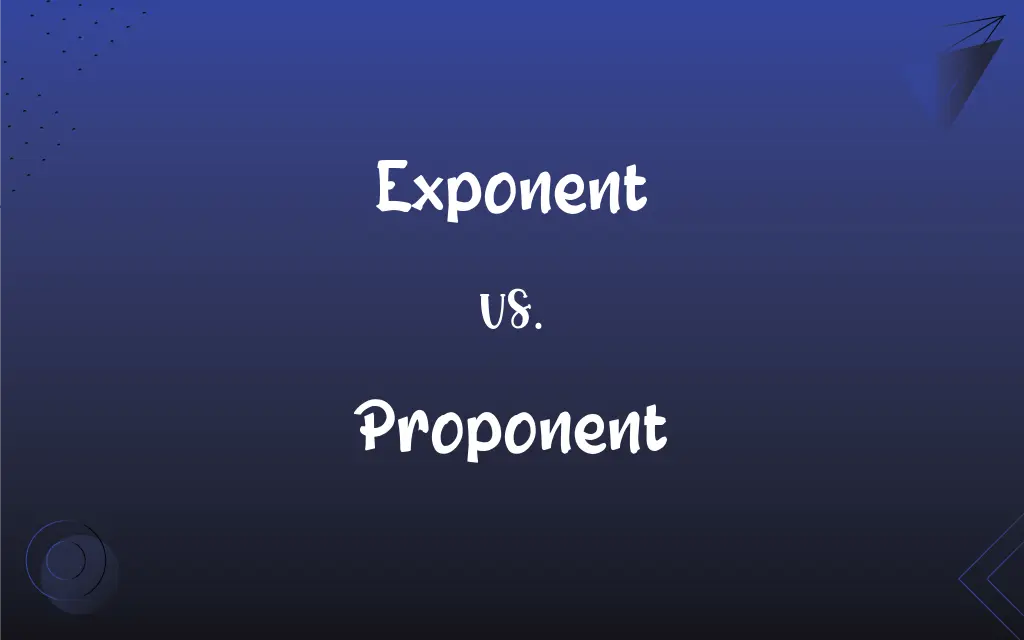Exponent vs. Proponent: What's the Difference?
By Harlon Moss || Updated on May 28, 2024
Exponent refers to a person who promotes or explains a theory or idea, while proponent is someone who advocates or supports a particular cause or proposal.

Key Differences
Exponent is often used to describe someone who actively promotes or elucidates a particular idea, theory, or methodology. This term can be applied to individuals known for their expertise and advocacy in a specific field. Proponent, on the other hand, refers to a person who supports or advocates for a particular cause, policy, or proposal. Unlike an exponent, a proponent's primary role is to endorse and push forward the acceptance or implementation of an idea or plan.
While an exponent focuses more on the explanation and dissemination of knowledge, a proponent emphasizes active support and promotion. Both roles are crucial in advancing ideas and causes, but they engage in different aspects of advocacy. Exponents often rely on their expertise and authority to explain concepts, whereas proponents may utilize various strategies to garner support and drive action.
In scientific and academic contexts, an exponent may be someone who elaborates on theories and contributes to academic discourse. Conversely, in political or social contexts, a proponent might work towards influencing public policy or social change by rallying support and organizing efforts.
An exponent's work is often characterized by intellectual and educational efforts, providing clarity and understanding of complex subjects. A proponent's efforts are typically marked by activism, campaigning, and strategic persuasion to achieve practical outcomes.
Comparison Chart
Definition
Person who promotes or explains a theory or idea
Person who advocates or supports a cause
ADVERTISEMENT
Focus
Explanation and dissemination of ideas
Active support and advocacy
Role in Advocacy
Emphasizes expertise and representation
Emphasizes endorsement and promotion
Contexts
Scientific, academic
Political, social
Example Sentence
"He is an exponent of modern art."
"She is a proponent of renewable energy."
Exponent and Proponent Definitions
Exponent
A person who explains or promotes a theory or idea.
Marie Curie was an exponent of radioactivity research.
ADVERTISEMENT
Proponent
An individual who pushes for the adoption of a specific policy.
He is a strong proponent of healthcare reform.
Exponent
A specialist who clarifies complex concepts to a broader audience.
The professor is an exponent of quantum mechanics.
Proponent
Someone who promotes the benefits of a particular idea or plan.
As a proponent of solar energy, she encourages its widespread use.
Exponent
An advocate known for their detailed understanding of a subject.
As an exponent of classical literature, she has written many insightful essays.
Proponent
A supporter who actively campaigns for a particular issue.
The senator is a proponent of tax cuts for small businesses.
Exponent
An authority in a specific area who educates others.
The scientist became an exponent of climate change theories.
Proponent
A person who supports or advocates for a cause.
She is a proponent of animal rights.
Exponent
One that expounds or interprets.
Proponent
One who argues in support of something; an advocate.
Exponent
One that speaks for, represents, or advocates
Our senator is an exponent of free trade.
Proponent
One who supports something; an advocate
Exponent
Abbr. exp(Mathematics) A number or symbol, as 3 in (x + y)3, placed to the right of and above another number, symbol, or expression, denoting the power to which that number, symbol, or expression is to be raised. Also called power.
Proponent
One who makes a proposal or proposition.
Exponent
Expository; explanatory.
Proponent
(legal) One who propounds a will for probate.
Exponent
One who expounds, represents or advocates.
Proponent
Making proposals; proposing.
Exponent
(mathematics) The number by which a value (called the base) is said to be raised to a power in exponentiation: for example, the in .
Proponent
Making proposals; proposing.
Exponent
The degree to which the root of a radicand is found, for example, the in .
Proponent
One who makes a proposal, or lays down a proposition.
Exponent
(linguistics) A manifestation of a morphosyntactic property.
Proponent
The propounder of a thing.
Exponent
(computing) The part of a floating-point number that represents its exponent value.
Proponent
A person who pleads for a cause or propounds an idea
Exponent
A number, letter, or any quantity written on the right hand of and above another quantity, and denoting how many times the latter is repeated as a factor to produce the power indicated
Proponent
An advocate who seeks to gain approval for a new initiative.
He became a proponent of education reform in his community.
Exponent
One who, or that which, stands as an index or representative; as, the leader of a party is the exponent of its principles.
Exponent
One who explains, expounds, or interprets.
Exponent
A person who pleads for a cause or propounds an idea
Exponent
Someone who expounds and interprets or explains
Exponent
A mathematical notation indicating the number of times a quantity is multiplied by itself
Exponent
Someone who represents or exemplifies a particular field.
He is considered a leading exponent of jazz music.
FAQs
What is an example of an exponent in science?
E.g., "Isaac Newton is an exponent of classical physics."
Can an exponent also be a proponent?
Yes, an individual can both explain and actively support an idea or cause.
What does a proponent do?
A proponent advocates for and supports the acceptance or implementation of a particular idea or policy.
How does an exponent differ from a proponent?
An exponent focuses on explaining and promoting ideas, while a proponent actively supports and advocates for causes.
How do exponents contribute to knowledge?
Exponents clarify and disseminate complex ideas, making them accessible to a wider audience.
What is an exponent in general terms?
An exponent is someone who promotes or explains a theory, idea, or concept.
What is a common role of a proponent?
A proponent often engages in campaigning, lobbying, and rallying support for a cause.
What motivates a proponent?
Proponents are usually motivated by a strong belief in the cause they support.
Can you give an example of a proponent?
E.g., "She is a proponent of free public education."
Is being an exponent limited to academic fields?
No, exponents can be found in various fields, including arts, sciences, and literature.
Can exponents be found in the arts?
Yes, exponents can promote and explain artistic movements and concepts.
Can an exponent be a public speaker?
Yes, exponents often speak publicly to share their knowledge and ideas.
What strategies do proponents use?
Proponents use campaigning, lobbying, and public speaking to gain support.
What is a key characteristic of a proponent?
Active and enthusiastic support for their cause.
How do exponents affect public understanding?
They enhance public understanding by explaining complex subjects in an accessible way.
Are proponents involved in activism?
Yes, proponents often engage in activism to promote their cause.
Can proponents influence public policy?
Yes, proponents actively work to influence and change public policy.
Do exponents need to be experts in their field?
Yes, exponents typically have a deep understanding and expertise in their area.
Do exponents write books or papers?
Yes, exponents often publish works to disseminate their ideas.
Can proponents work in organizations?
Yes, proponents can work within organizations to further their causes.
About Author
Written by
Harlon MossHarlon is a seasoned quality moderator and accomplished content writer for Difference Wiki. An alumnus of the prestigious University of California, he earned his degree in Computer Science. Leveraging his academic background, Harlon brings a meticulous and informed perspective to his work, ensuring content accuracy and excellence.
































































